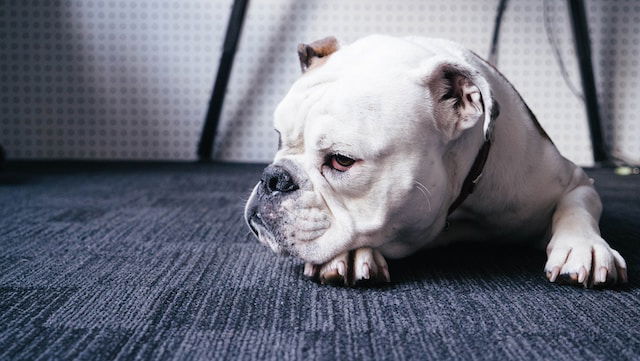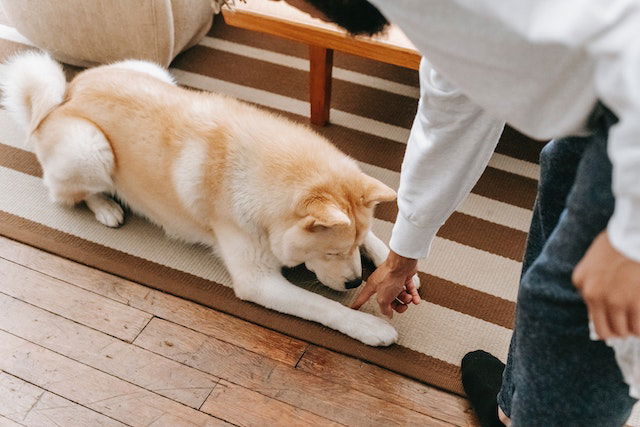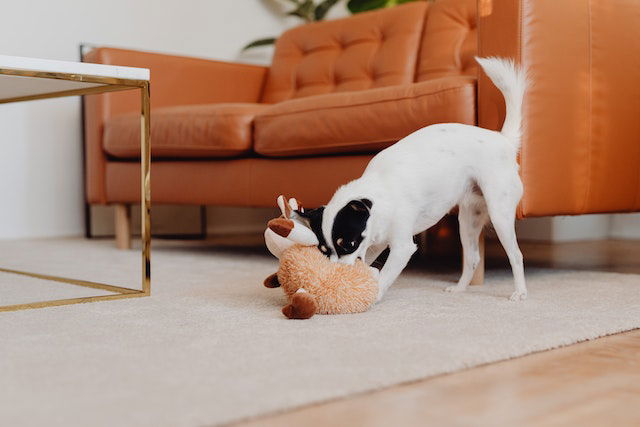We're an affiliate
We hope you love the products we recommend! Just so you know, we may collect a share of sales or other compensation from the links on this page at no additional cost to you. Thank you if you use our links, we really appreciate it!
Most dog owners understand how frustrating it can be to deal with pups who scratch a lot. One of the places where such dogs love to dig into is the carpet.
Although this behavior may seem cute to you and enjoyable on the dog’s side, it may become problematic when done excessively or destructively.
Since this is a problem that affects many pet parents, we’ve researched the common reasons for your dog’s need to burrow in the carpet and provided helpful tips to address this behavior.
Why Do Dogs Scratch the Carpet?
There are several reasons why dogs claw the carpet and these can be traced back to instinctual behaviors, rooted in their primal nature, and serve as a way of marking territory.
Additionally, boredom can contribute to this activity, highlighting the importance of providing mental and physical stimulation for our canine companions.
Now, let’s break down each reason why dogs scratch the carpet.
1. It’s an instinctual behavior
All dogs have an inborn desire to dig, but some breeds are prone to dig more than others. Some dog breeds, like Dachshunds, were originally bred to burrow into holes in search of small prey.
You should not be surprised when your Dachshund scratches and nests into the soft spots across your home.
Ratters are more prone to scratch and burrow than the other breed group. Even though these dogs are unlikely to scratch excessively or cause destruction when burrowing, you need to watch out for excesses.
This instinct to dig is what makes dogs scratch on carpets or dig into the garden in an attempt to fulfill their desire.
2. They’re marking the area
Dogs have scent glands (known as eccrine glands) located on the paw pads which provide an efficient way of marking territory by scratching.

Your furry friend may scratch on a new carpet to leave a scent trail behind and possess the marked spot in your home.
3. Boredom
Docile dogs with pent-up energy are likely to get restless when left alone for extended periods. A bored dog is naturally drawn to create fun activities, and carpet-scratching is one of them
Engaging their paws in actions such as scratching and burrowing helps the dog release pent-up energy while getting self-entertainment.
Dogs who are excessively bored may scratch and dig into the carpet causing serious damage.
4. Separation anxiety
Dogs with separation anxiety are likely to get nervous or distressed when they see their human caregivers preparing to leave the house.
Such dogs may do all they can to prevent their human guardians from leaving, including engaging in harmful actions like scratching the floor.
A distressed dog with separation anxiety may also burrow into the carpet to release their worry by staying busy.
5. They’re seeking your attention
If you turn your attention to your furry friend every time they scratch the carpet, you are teaching them how they can easily catch your valued attention.
This is a learned behavior in dogs that you may have accidentally reinforced by giving them your attention or petting them.
Your dog knows that they will get your eyes when they turn their nails on the carpet and it is now part of their communication to you.
6. They can smell something interesting
Dogs have a very keen sense of smell. Sometimes when you see them scratching the carpet and sniffing around attentively, they might be looking for something exciting, like crushed treats.
If you’ve seen your dog investigating a scent on your carpet, you can help them out by uncovering what they’re looking for.
Most dogs have the habit of scratching and sniffing a particular spot on the carpet where they left liquid messes to mark it again.
If this is the cause, make sure to clean the carpet thoroughly with a pet odor eliminator to unmark the scent by breaking down the odor source.
7. They are seeking comfort
If your dog scratches a particular section of the carpet and proceeds right away to sleep in the same area, then they are just seeking comfort.
Dogs love to snuggle up in comfy spaces, and by scratching the carpet, they are trying to make the area as cozy and warm as possible.
8. Inadequate training
Unfortunately, some dogs may scratch the carpet because they are not effectively trained. Such dogs may engage in other harmful actions such as destroying furniture, chewing on items, excessive barking, or biting.
In most cases, pet parents are to blame for the dog’s lack of behavioral understanding, by accidentally reinforcing bad habits.
Make sure to train your dog effectively and redirect unwanted behavior by socializing and teaching new skills.
9. Overgrown nails
Long nails are uncomfortable for dogs when walking. They can cause the dog to slip because of placing the feet in an unnatural position.
Dogs with untrimmed nails may scratch on the carpet or furniture to relieve discomfort or as an attempt to splinter long nails.
Observing The Behavior
To address your dog’s carpet-scratching behavior, you need to monitor their activities and identify how and when they engage in this behavior.
Scratching, burrowing, and digging are all instinctive behaviors in dogs. But you need to pay close attention and tell between normal and compulsive behavior.
If your dog is scratching the carpet too frequently, then this is a sign that something is wrong somewhere.

Start by observing how they scratch the carpet and any other body language they use during such periods.
Some dogs will scratch the carpet and proceed to pull or chew the fabric destructively. This is a possible coping mechanism for stress and anxiety.
If your dog scratches the carpet when playing with chew bones, they may be attempting to bury the item to keep them safe for a later time.
My Dog Keeps Scratching the Carpet, How to Stop This Behavior?
The best way to address carpet-scratching behavior in your dog is to identify the root cause and use the correct approach to redirect the dog.
The following are some of the remedies you can implement to cure your dog’s obsession with burrowing on the carpet:
1. Exercise your dog
If you suspect that your furry friend is scratching the carpet out of boredom, you can increase their exercise to keep them active and fit.
Taking your lovely pup out for daily walks and runs is a good way of expending energy in positive ways. You can also play indoor games, such as tug of war, with your dog to keep them away from boredom.
It’s unlikely that a tired dog will create time to scratch the carpet or dig into other soft surfaces.
2. Clean the carpet
With such a strong sense of smell, dogs can detect the faintest items dropped on your carpet, and this may lead to continual scratching and sniffing.
You can solve this problem by cleaning your carpet thoroughly to prevent your furry friend from scratching and investigating the fabrics on the carpet.
Cleaning your carpet is also beneficial for your health and that of your canine friend since it dispels germs, dirt, and small debris.
3. Train your dog
Training your dog right from puppyhood into adult life helps form excellent companions with responsible behavior.
An untrained dog is most likely prone to show aggressive behavior, lack social skills, and engage in destructive actions such as carpet scratching.
You should teach your dog appropriate ways of getting your attention rather than relying on obstructive means like scratching or growling.
Don’t turn your eyes on your furry friend when they scratch the carpet near you. Instead, you should provide them with a safe alternative to play with.
Use positive reinforcement techniques when redirecting your dog’s attention from the carpet by rewarding good behavior.
Keep in mind that dog training is not a one-time event. It should be done consistently and form part of your dog’s timetable whenever possible.
4. Reduce stress and anxiety
Sometimes dogs may dig into the carpet as a way of coping with emotional distress. You can solve this by creating a calm environment for your furry friend at home.
Dogs thrive where they know what’s expected of them. Have a clear routine for your dog and stick to it as much as possible.
Exposing your furry friend to uncertainty is what breeds stress and builds into anxiety and depression.
5. Offer some dog toys
Get a variety of dog toys to offer entertainment, physical stimulation, and mental exercise, and fulfill their instinctual behavior to bite and pull.

6. Provide alternative scratching spots
While taking your dog’s attention from the carpeted floor in your house, be sure to provide them with an alternative option for scratching.
Invest in high-quality scratch pads for dogs, made with corrugated board and covered with a soft fabric for easy scratching.
Your furry friend will appreciate the soothing texture of scratch pads which is more appealing than the plain fabric material on the carpet.
If your dog loves nesting and burrowing, they will appreciate a cozy donut bed to get warmth, snuggle up and dig into.
7. Trim your dog’s nails
Long nails are a distraction for dogs when they walk and they also induce the dog to scratch on various surfaces accidentally.
Get a nail grinder or trimming scissors to shorten your dog’s nails and keep them neat. Dogs with short nails are less likely to scratch on surfaces for no apparent reason.
Keeping your dog’s nails short also helps in preventing them from splintering which can be a painful experience for your dog.
Furthermore, short nails help the dog to maintain good posture when walking and this reduces the chances of sliding on the floor.
8. Don’t punish your dog
Scratching and burrowing are instinctive activities for all dogs. You should not punish your dog for doing a natural activity.
Scolding your furry friend for digging into the carpet may lead to confusion and anxiety. At worst, such actions may spoil your relationship with the dog and make everything worse.
This is because the dog will link you to bad events in their lives and do what they can to stay away from you.
Conclusion
Scratching and digging are instinctive behaviors in dogs but sometimes they can be confusing or become compulsive when done excessively.
The first step in providing solutions to this behavior is identifying the reasons why your dog scratches the carpet.
We’ve observed that providing a safe alternative for your dog to scratch on and dig is a good way of redirecting them from your carpet.
Train your dog to redirect the scratching instincts to safe alternatives and reinforce the behavior when you see progress.
It may take some time before your dog breaks the habit of digging into your carpet, so you need to be consistent and patient in training.
Laura is the founder of Furs'n'Paws. She is a also a pet writer and expert with more than 20 years of experience of working with dogs and cats. She developed a very strong love for animals at a young age. Her passion led her to establish a thriving pet sitting and dog walking business in Dubai. As an expert in pet training, behavior, and nutrition, Laura is committed to helping pet owners and pet lovers by offering high-quality information on a wide range of topics.



No responses yet